高考英语必背知识点总结归纳
高考英语必考语法知识点归纳

高考英语必考语法知识点归纳高考英语必备语法知识整理1高考英语必备语法——常见连接词(1)表选择关系或对等关系的连接词:either…or…,neither…nor…,or,aswellas,and,both…and….(2)表因果关系的连接词:therefore,so,asaresult,astheresultof,becauseof,dueto,owingto,thanksto 等。
(3)表时间顺序的连接词:the moment,as soon as,at first,then,later,mean while,at the beginning,in the end,before long,for the first time,the minute.(4)表转折关系的连接词:yet,and yet,but,while,on the contrary,on the otherhand,however,at the same time等。
(5)表解释说明的连接词:that is,that is to say,in other words,such as,for example,for instance,and soon,etc,and the like,and what not等。
(6)表总结的连接词:in aword,onthe whole,in short,to sumup,in all 等2高考英语必备语法——主语主语:主语是一个句子所叙述的主体,一般位于句首。
在原始的简单句中,主语可由名词、代词、数词、名词化的形容词表示。
例如:During the 1990s, American country music has become more and more popular.(名词)We often speak English in class.(代词)One-third of the students in this class are girls.(数词)The rich should help the poor.(名词化的形容词)3高考英语必备语法——谓语谓语(动词):谓语说明主语所做的动作或具有的特征和状态。
高考英语必背知识点及常考点大全
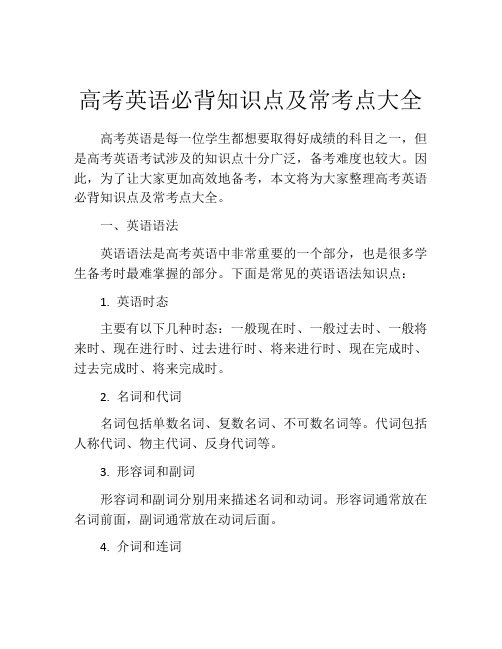
高考英语必背知识点及常考点大全高考英语是每一位学生都想要取得好成绩的科目之一,但是高考英语考试涉及的知识点十分广泛,备考难度也较大。
因此,为了让大家更加高效地备考,本文将为大家整理高考英语必背知识点及常考点大全。
一、英语语法英语语法是高考英语中非常重要的一个部分,也是很多学生备考时最难掌握的部分。
下面是常见的英语语法知识点:1. 英语时态主要有以下几种时态:一般现在时、一般过去时、一般将来时、现在进行时、过去进行时、将来进行时、现在完成时、过去完成时、将来完成时。
2. 名词和代词名词包括单数名词、复数名词、不可数名词等。
代词包括人称代词、物主代词、反身代词等。
3. 形容词和副词形容词和副词分别用来描述名词和动词。
形容词通常放在名词前面,副词通常放在动词后面。
4. 介词和连词介词和连词用来连接词语,介词通常放在名词或代词前面,连词用来连接词语或句子。
5. 句型常见的句型有陈述句、疑问句、祈使句、感叹句等。
二、词汇高考英语中,词汇量是很重要的一个方面。
下面是高考英语常见的词汇知识点:1. 同义词和反义词同义词指的是意思相同或相近的词,反义词则指的是意思相反的词。
2. 前缀和后缀前缀和后缀指的是词根前面或后面的一些字母,用来改变词义。
3. 词形变化词形变化指的是单数名词变成复数名词,动词变化成不同的时态等。
4. 词义辨析词义辨析指的是相似但细微差异的单词之间的区别,如effect和affect等。
三、阅读理解阅读理解是高考英语中的重头戏,通常占据比较多的分数,因此要认真准备。
下面是阅读理解需要注意的知识点:1. 词汇理解要能够正确理解课文中的词汇,而不是仅根据字面去理解,同时还要掌握一些固定的短语和表达方式。
2. 语法分析要能够正确理解课文中的语法结构,包括句子主谓宾、修饰语、同位语等。
3. 推理判断要能够根据课文中的信息进行推理和判断,并能够理解作者的观点和态度。
四、写作高考英语中的写作部分通常包括作文和翻译。
2024高考英语必背知识点及常考点大全

2024高考英语必背知识点及常考点大全一、语法知识点:1.时态的用法:一般现在时、一般过去时、一般将来时、现在进行时、过去进行时、过去将来时、现在完成时、过去完成时;2.被动语态的构成和用法;3.定语从句的引导词及关系代词的使用;4.名词性从句的引导词及其用法;5.直接引语和间接引语的转换;6.并列连词、从属连词的用法;7.句型的转换:倒装句、虚拟语气句型、条件句、让步状语从句等;8.动词的非谓语形式:不定式、动名词、现在分词、过去分词的用法;9.名词、代词、形容词、副词、介词的用法;10.比较等级的构成和用法。
二、词汇知识点:1.高中英语常见词汇、常用短语;2.常用的形容词和副词的比较级和最高级形式;3.常用短语动词的使用;4.常见的动词短语及其搭配;5.常用的固定搭配和短语;6.常用的形容词和副词的词义辨析;7.常用的同义词和反义词。
三、阅读理解知识点:1.阅读理解题型的特点及解题技巧;2.看图作文的写作方法;3.阅读理解中的细节题、推理题、主旨题、态度题的解题方法;4.阅读文章的整体理解能力;5.根据语境猜测词义的能力。
四、写作知识点:1.话题作文的写作思路和方法;2.议论文的写作结构及篇章组织方法;3.日记、书信、邀请函等文体写作方法;4.图画作文的写作技巧和常用句型;5.口头表达的技巧和常用句型。
五、听力知识点:1.听力题型的特点及解题技巧;2.长对话和短文听力的理解能力;3.根据听力材料获取信息的能力;4.根据听力材料进行推理的能力。
六、常见考点:1. 动词搭配:look forward to、take part in、get along with、pay attention to等;2. 名词单复数形式:sheep、fish、information、furniture等;3.冠词的用法:不定冠词、定冠词、零冠词;4.代词的指代关系、人称和数的一致性;5. 并列连词的用法:and、but、or、so、for、yet等;6.计算时间、距离、速度的表达方式;7.比较等级:原级、比较级、最高级。
高考英语必背的知识点

高考英语必背的知识点英语是高考是必考的的科目,也是很多学生的薄弱科目,因此高考前的知识复习要十分重视。
下面是小编为大家整理的高考英语必背的知识点,希望对大家有用!高考英语知识点归纳1. 一般现在时①表示客观事实或普通真理(不受时态限制) Water boils at 100oC.②表示现状、性质、状态时多用系动词或状态动词;表示经常或习惯性的动作,多用动作动词,且常与表频率的时间状语连用。
Ice feels cold.We always care for each other and help each other.③表示知觉、态度、感情、某种抽象的关系或概念的词常用一般现在时:see、hear、smell、taste、feel、notice、agree、believe、like、hate、want、think、belong seem等。
如: I know what you mean.Smith owns a car and a house.All the students here belong to No.1 Middle School.④在时间、条件状语从句中常用一般现在时代替将来时。
但要注意由if 引导的条件状语从句中可以用shall或will表“意愿”,但不表示时态。
如果你愿意接受并参加我们的舞会,我的家人会非常高兴。
⑤少数用于表示起止的动词如come、go、leave、arrive、fly、return、start、begin、pen、close、end、stop等常用一般现在时代替将来时,表示一个按规定、计划或安排要发生的动作。
当be表示根据时间或事先安排,肯定会出现的状态,只用一般现在时。
The shop closes at 11:00 p.m. every day.高考英语知识重点as;which引导定语从句异同as, which 都能引导限制性或非限制性的定语从句。
(1)在引导限制性定语从句时;①which从句修饰的先行词是名词(词组),which可与that换用,作宾语时可省去。
高考英语高频知识点总结

高考英语高频知识点总结高考英语作为中国高中阶段最重要的考试科目之一,备受学生关注。
为了能在考试中取得好成绩,掌握高频知识点是非常关键的。
本文将总结一些高考英语的高频知识点,希望对即将参加高考的同学们有所帮助。
一、语法知识点1. 时态:高考常涉及的时态有一般现在时、一般过去时、现在进行时、过去进行时、现在完成时、过去完成时等。
理解这些时态的用法和区别是解答题目中时态问题的关键。
2. 从句:名词性从句、定语从句和状语从句是高考中的热门考点。
掌握它们的引导词和语序,能够帮助我们正确理解句子的整体意思。
3. 被动语态:被动语态在高考中频繁出现。
我们需要理解被动语态的构成和用法,以便正确转换句子的语态。
4. 单词辨析:高考中常常考察一些近义词、反义词的辨析。
在备考过程中,我们需要仔细研究这些词汇,并进行适当的归纳总结。
二、阅读理解高考英语阅读理解是一个考查考生综合能力的重要环节。
以下是一些值得注意的知识点。
1. 写作手法:作者往往会运用一些手法来增强文章的说服力,例如对比、因果、列举等。
我们需要通过阅读大量的文章来熟悉和理解这些写作手法,并能够准确捕捉文章中的关键信息。
2. 推理判断:在阅读理解题中,我们需要利用已有信息进行推理和判断。
这要求我们有较强的逻辑思维和分析能力。
3. 理解词义:正确理解文章中的词义对于回答问题至关重要。
学会通过上下文推测词义,并能够灵活运用词汇解题。
三、写作技巧高考英语写作要点往往与学生们日常写作中的问题相关。
以下是一些值得注意的技巧。
1. 增加词汇量:丰富的词汇量能够使我们的写作得分更高。
背诵高考常考的词汇和短语,积累一些高级句型和表达方式是必不可少的。
2. 逻辑清晰:写作中,我们要让文章的逻辑结构清晰,条理分明。
通过使用恰当的连接词和过渡词,使文章的段落关系更加紧密。
3. 语法准确:语法错误会导致我们的分数受到严重损失。
在写作过程中,我们需要特别注意一些常见的语法错误,例如主谓一致、时态一致和主语动词一致等。
高考英语语法知识点归纳总结

高考英语语法知识点归纳总结高考英语语法必备知识点语法知识点11.as...as...引导的比较级:(1)“as +形容词或副词原级+ as+被比较对象”结构。
例句:He studies as hard as you. 他像你一样学习努力。
(2)在否定句或疑问句中可用not so…as…. 例句:He can not run so/as fast as you. 他没你跑得快。
2.only引导的倒装句型:only +状语 (或状语从句)位于句首时,句子部分倒装。
例句: Only by diligence and honesty can one succeed in life. 只有勤奋、正直,一个人在生活中才能成功。
注意:但 only修饰主语时,不倒装。
例句: Only thatgirl knew how to work out the problem. 只有那位女生知道怎样解那道题。
3.wish引导的虚拟语气:wish 后面的从句,当表示与事实相反的情况,或表示将来不太可能实现的愿望时,其宾语从句的动词形式为:(1)表示对现在情况的虚拟:从句动词用过去式或过去进行式表示,be 的过去式用were.I wish I knew the answer to the question. 我希望知道这个问题的答案。
(可惜不知道。
)(2)表示对过去情况的虚拟:从句动词用had +过去分词。
I wish (that) I hadn’t wasted so much time. 我后悔不该浪费这么多时间。
( 实际上已经浪费掉了。
)(3)表示对将来的主观愿望:谓语动词形式为“would/ should/ could/ might +动词原形”。
在这种情况下,主句的主语与从句的主语不能相同,因为主句的主语所期望的从句动作能否实现,取决于从句主语的态度或意愿(非动作名词除外) 。
I wish it would stop raining. 但愿雨能停止。
英语高考必考知识点
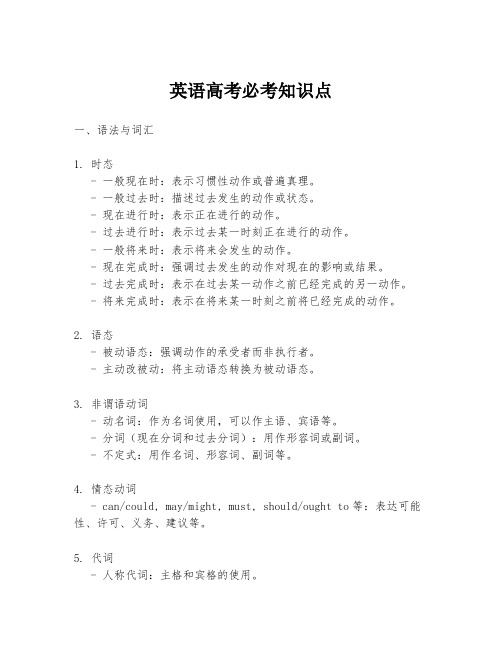
英语高考必考知识点一、语法与词汇1. 时态- 一般现在时:表示习惯性动作或普遍真理。
- 一般过去时:描述过去发生的动作或状态。
- 现在进行时:表示正在进行的动作。
- 过去进行时:表示过去某一时刻正在进行的动作。
- 一般将来时:表示将来会发生的动作。
- 现在完成时:强调过去发生的动作对现在的影响或结果。
- 过去完成时:表示在过去某一动作之前已经完成的另一动作。
- 将来完成时:表示在将来某一时刻之前将已经完成的动作。
2. 语态- 被动语态:强调动作的承受者而非执行者。
- 主动改被动:将主动语态转换为被动语态。
3. 非谓语动词- 动名词:作为名词使用,可以作主语、宾语等。
- 分词(现在分词和过去分词):用作形容词或副词。
- 不定式:用作名词、形容词、副词等。
4. 情态动词- can/could, may/might, must, should/ought to等:表达可能性、许可、义务、建议等。
5. 代词- 人称代词:主格和宾格的使用。
- 物主代词:形容词性物主代词和名词性物主代词。
- 反身代词、指示代词、疑问代词等。
6. 冠词- 不定冠词(a/an)和定冠词(the)的使用。
7. 介词- 常用介词的用法,如at, in, on, for, with, by, etc.8. 连词- 并列连词:and, but, or, so等。
- 从属连词:because, since, although, if, when, etc.9. 句子结构- 简单句、复合句和复杂句的构成。
- 陈述句、疑问句、祈使句和感叹句。
10. 词汇- 常用词汇的记忆和理解。
- 同义词、反义词、短语动词等。
二、阅读理解1. 快速阅读- 快速获取文章大意和主旨。
- 通过标题、首段、尾段和段落首句快速把握文章结构。
2. 细节理解- 理解文章中的具体信息和细节。
- 通过上下文推断生词或难句的含义。
3. 推理判断- 根据文章内容进行逻辑推理。
高考英语知识点归纳总结及答题技巧
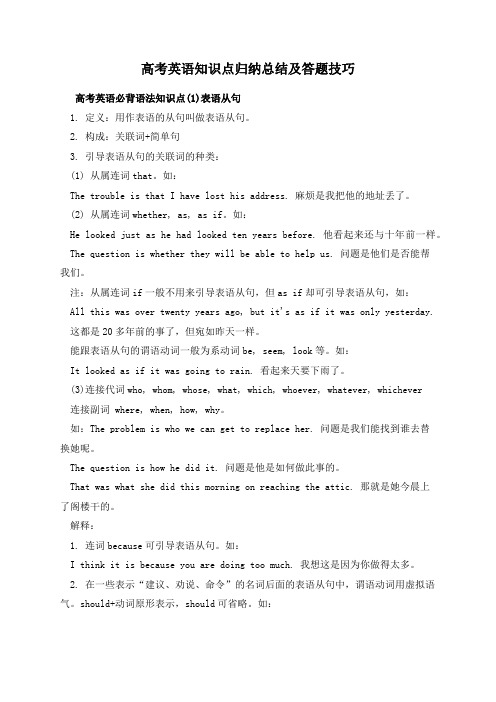
高考英语知识点归纳总结及答题技巧高考英语必背语法知识点(1)表语从句1. 定义:用作表语的从句叫做表语从句。
2. 构成:关联词+简单句3. 引导表语从句的关联词的种类:(1) 从属连词that。
如:The trouble is that I have lost his address. 麻烦是我把他的地址丢了。
(2) 从属连词whether, as, as if。
如:He looked just as he had looked ten years before. 他看起来还与十年前一样。
The question is whether they will be able to help us. 问题是他们是否能帮我们。
注:从属连词if一般不用来引导表语从句,但as if却可引导表语从句,如:All this was over twenty years ago, but it's as if it was only yesterday. 这都是20多年前的事了,但宛如昨天一样。
能跟表语从句的谓语动词一般为系动词be, seem, look等。
如:It looked as if it was going to rain. 看起来天要下雨了。
(3)连接代词who, whom, whose, what, which, whoever, whatever, whichever连接副词 where, when, how, why。
如:The problem is who we can get to replace her. 问题是我们能找到谁去替换她呢。
The question is how he did it. 问题是他是如何做此事的。
That was what she did this morning on reaching the attic. 那就是她今晨上了阁楼干的。
解释:1. 连词because可引导表语从句。
高考英语必考知识点归纳表

高考英语必考知识点归纳表一、词汇知识1. 同义词、反义词、近义词的辨析2. 常用短语、习惯用语的辨析和应用3. 词性转换及词汇的派生形式4. 常见固定搭配的词汇二、语法知识1. 时态的使用和转换2. 语态的使用和转换3. 虚拟语气的使用4. 主谓一致的原则5. 必要时使用非谓语动词作定语、状语等6. 并列结构以及连接词的应用和使用7. 从句的种类及其使用8. 平行结构的应用和使用三、阅读理解1. 找出文章的主题和要点2. 掌握文章中的关键词及其含义3. 掌握文章的结构和逻辑关系4. 理解作者的写作目的和观点5. 比较不同文化背景下的观点和见解6. 分析文中的例证和论证方式7. 根据上下文推断词义8. 掌握常见的修辞手法和修辞方法四、完形填空1. 掌握文章的结构和逻辑关系2. 阅读文章时注意上下文的衔接和逻辑推理3. 根据上下文推断词义4. 找到文章的主题和中心思想5. 注意代词的指代关系6. 理解作者的写作目的和观点五、写作技巧1. 书面表达的基本要求2. 从多个角度分析问题并提出自己的观点3. 运用丰富的词汇和句型表达自己的意见4. 运用恰当的连接词进行段落之间、句子之间的衔接5. 注意语法和拼写的准确性六、听力技巧1. 培养听懂联系词的能力2. 掌握常用口语表达方式和习惯用语3. 听懂长句和复杂句的关键信息4. 注意听取细节和数字5. 分辨并区分不同人物的声音和口音6. 掌握常见的听力考点和题型七、口语技巧1. 熟练掌握常用口语表达方式和习惯用语2. 发音准确、语调自然3. 表达清晰、连贯4. 注意使用适当的词汇和句型5. 积极互动,主动提问或回答问题6. 注意礼貌和尊重对话对象这些是高考英语必考的知识点归纳表,包括词汇知识、语法知识、阅读理解、完形填空、写作技巧、听力技巧和口语技巧。
掌握这些知识点对于高考取得好成绩非常重要。
希望以上内容对你有所帮助。
高考英语语法必背5000条 (打印背诵版)

高考英语语法必背5000条 (打印背诵版)
为了帮助考生备考高考英语语法,以下是一份包含5000条必备语法知识的打印背诵版。
这些语法知识点涵盖了高考英语考试中常见的语法题型,希望对你的备考有所帮助。
1. 名词
- 名词的定义和用法
- 可数名词与不可数名词
- 单数名词和复数名词的变化规则
- 名词所有格的表示方法
2. 冠词
- 定冠词和不定冠词的用法
- 冠词的省略
3. 代词
- 人称代词和物主代词的用法
- 反身代词的用法
- 指示代词和疑问代词的用法
- 相互代词和不定代词的用法
4. 动词
- 动词的基本概念
- 动词的时态和语态
- 动词的非谓语形式
- 动词的数和人称变化规则
5. 形容词
- 形容词的定义和用法
- 形容词的比较级和最高级形式
- 形容词放在句子中的位置和修饰规则
6. 副词
- 副词的定义和用法
- 副词修饰动词、形容词和副词的规则- 表示程度、时间和方式的副词
7. 介词
- 介词的定义和用法
- 常见的介词及其搭配
8. 连词
- 并列连词和从属连词的用法
- 时间连词和条件连词的用法
9. 句子
- 句子的基本结构
- 主谓一致的规则
- 定语从句和状语从句的用法
10. 语态
- 被动语态和主动语态的区别
- 被动语态的构成和用法
这些是高考英语语法必备的5000条知识点的简要概述。
你可以将该文档打印出来进行背诵和复习,以提高对英语语法的理解和应用能力。
祝你在高考中取得优异的成绩!。
高考英语必背词汇大全汇总

高考英语必背词汇大全汇总一、名词1. ability: 能力2. accident: 事故3. advice: 建议4. advertisement: 广告5. agreement: 同意,协议6. airport: 机场7. ambition: 抱负,雄心8. anger: 怒火9. animal: 动物10. answer: 答案11. apartment: 公寓12. apple: 苹果13. area: 区域14. art: 艺术15. article: 文章16. audience: 观众17. author: 作者18. baby: 婴儿19. back: 背部20. bag: 袋子,包21. balance: 平衡22. ball: 球23. bank: 银行24. bar: 酒吧25. base: 基地26. bathroom: 浴室27. beach: 海滩28. bear: 熊29. beauty: 美丽30. bed: 床31. bedroom: 卧室32. beer: 啤酒33. belief: 信念34. bell: 钟35. bicycle: 自行车36. bird: 鸟37. birth: 出生38. birthday: 生日39. blood: 血液40. boat: 船41. body: 身体42. book: 书43. bottle: 瓶子44. box: 盒子45. boy: 男孩46. boyfriend: 男朋友47. bread: 面包48. breakfast: 早餐49. brother: 兄弟50. building: 建筑51. bus: 公交车52. business: 生意,业务53. button: 按钮54. buy: 购买55. cake: 蛋糕56. camera: 相机57. camp: 露营58. capital: 首都,资本59. car: 汽车60. card: 卡片61. career: 职业,事业62. cat: 猫63. cause: 原因,事业64. center: 中心65. chair: 椅子66. challenge: 挑战67. change: 变化68. character: 人物,性格69. chart: 图表70. check: 检查,支票71. chef: 厨师72. child: 孩子73. chocolate: 巧克力74. choice: 选择75. church: 教堂76. cigarette: 香烟77. city: 城市78. class: 班级,课程79. classroom: 教室80. client: 客户81. clock: 时钟82. clothes: 衣服83. cloud: 云84. club: 俱乐部85. coffee: 咖啡86. color: 颜色87. computer: 计算机88. concert: 音乐会89. condition: 条件90. conference: 会议91. connection: 连接92. construction: 建设93. contract: 合同94. control: 控制95. conversation: 对话96. cookie: 饼干97. country: 国家98. cousin: 堂兄弟/堂姐妹99. cow: 奶牛100. crash: 碰撞二、动词1. accept: 接受2. achieve: 实现,达到3. act: 行动,举动4. add: 添加5. admire: 钦佩,赞美6. admit: 承认,允许进入7. adore: 崇拜,喜爱8. agree: 同意9. aim: 目标,瞄准10. allow: 允许11. announce: 宣布12. answer: 回答,答复13. apologize: 道歉14. appear: 出现15. appreciate: 感激,欣赏16. argue: 争论17. arrive: 到达18. ask: 询问,请求19. assess: 评估,估价20. assist: 帮助21. attack: 攻击22. attempt: 尝试23. avoid: 避免24. bake: 烘焙25. balance: 平衡26. ban: 禁止27. bathe: 洗澡28. behave: 表现29. believe: 相信30. bet: 打赌31. boil: 煮沸32. borrow: 借33. bother: 打扰34. bounce: 弹跳35. break: 打破36. breathe: 呼吸37. brush: 刷38. build: 建立39. burn: 燃烧40. buy: 购买41. call: 打电话,呼叫42. calm: 镇静,平静43. cancel: 取消44. care: 关心45. carry: 携带46. catch: 捕捉47. cause: 引起48. celebrate: 庆祝49. change: 改变50. chat: 聊天三、形容词1. able: 能够的2. absolute: 绝对的3. academic: 学术的,学院的4. accurate: 精确的5. active: 积极的,活跃的6. actual: 实际的7. additional: 附加的8. adult: 成年人的9. affective: 情感的10. afraid: 害怕的11. aggressive: 侵略性的12. alert: 警惕的13. alive: 活着的14. ancient: 古老的15. angry: 生气的16. anxious: 焦虑的17. appropriate: 适当的18. artificial: 人造的19. ashamed: 羞愧的20. attractive: 有吸引力的21. available: 可获得的22. aware: 意识到的23. awful: 糟糕的24. bad: 糟糕的25. beautiful: 美丽的26. big: 大的27. bitter: 苦的28. black: 黑色的29. blue: 蓝色的30. bold: 大胆的31. boring: 无聊的32. brave: 勇敢的33. bright: 明亮的34. brilliant: 杰出的,聪明的35. broad: 宽广的36. busy: 忙碌的37. calm: 平静的38. careful: 小心的39. certain: 确定的40. cheap: 便宜的41. cheerful: 高兴的42. chief: 主要的43. childish: 孩子气的44. choice: 选择的45. clean: 干净的46. clever: 聪明的47. close: 接近的48. cloudy: 多云的49. cold: 冷的50. colorful: 色彩丰富的四、副词1. abroad: 在国外2. absolutely: 绝对地3. accidentally: 意外地4. actively: 积极地5. actually: 实际上6. afterwards: 之后7. again: 再次8. ahead: 向前9. alike: 相似地10. all: 全部地11. almost: 几乎12. alone: 单独地13. also: 也14. always: 总是15. annually: 每年16. anyway: 无论如何17. anywhere: 任何地方18. apart: 分开地19. approximately: 大约20. around: 周围21. aside: 在一边22. automatically: 自动地23. away: 离开24. back: 回来25. badly: 糟糕地26. basically: 基本上27. beautifully: 美丽地28. before: 之前29. behind: 在后面30. below: 在下面31. besides: 此外32. best: 最好地33. better: 更好地34. between: 在两者之间35. beyond: 超过36. briefly: 简要地37. bright: 明亮地38. briskly: 轻快地39. broadly: 广泛地40. busily: 忙碌地41. by: 通过42. calmly: 平静地43. carelessly: 粗心地44. certainly: 当然45. cheaply: 便宜地46. cheerfully: 高兴地47. clearly: 清楚地48. closely: 密切地49. commonly: 普遍地50. completely: 完全地五、连词1. after: 在...之后2. although: 虽然3. and: 和,与4. as: 因为5. as if: 仿佛6. as soon as: 一...就...7. because: 因为8. before: 在...之前9. but: 但是10. by the time: 到...的时候11. either...or: 要么...要么...12. even if: 即使13. even though: 即使14. for: 因为15. if: 如果16. in case: 以防17. neither...nor: 既不...也不...18. nor: 也不19. not only...but also: 不仅...而且...20. or: 或者21. since: 自从22. so: 所以23. than: 比24. that: 那个25. though: 虽然26. unless: 除非27. until: 直到28. when: 当...时候29. whenever: 无论何时30. where: 在哪里31. wherever: 无论哪里32. while: 当...时候33. yet: 然而六、介词1. about: 关于2. above: 在...上面3. across: 横过4. after: 在...之后5. against: 反对6. along: 沿着7. among: 在...之中8. around: 在周围9. as: 如同10. at: 在...,以11. before: 在...之前12. behind: 在...之后13. below: 在...下面14. beneath: 在...下面15. beside: 在...旁边16. between: 在...之间17. beyond: 超过18. by: 通过19. down: 向下20. during: 在...期间21. for: 为了22. from: 来自23. in: 在24. inside: 在...内部25. into: 进入26. like: 像27. near: 靠近28. of: 属于29. off: 关闭,离开30. on: 在...上面31. onto: 到...上面32. out: 在外面33. outside: 在...外部34. over: 在其上35. round: 围绕36. through: 通过37. throughout: 自始至终38. to: 到39. toward: 向40. under: 在...下面41. underneath: 在...下面42. until: 直到43. up: 向上44. upon: 在...之上45. with: 和...一起46. within: 在...之内47. without: 没有48. worth: 值得49. according to: 根据50. because of: 因为51. in addition to: 除了...之外52. in front of: 在...前面53. in the middle of: 在...的中间54. instead of: 代替55. next to: 在...旁边56. as for: 至于57. as of: 截至58. due to: 由于59. regardless of: 不管60. in spite of: 尽管61. on behalf of: 代表62. aside from: 除了63. as per: 根据64. by means of: 通过65. in case of: 在...情况下66. with regard to: 关于67. on account of: 因为68. in light of: 鉴于69. with respect to: 关于70. in exchange for: 作为交换71. in terms of: 就...而言72. pursuant to: 根据73. as well as: 以及74. according as: 照...方式75. on the basis of: 根据76. on top of: 在...上方77. in pursuit of: 追求78. on the subject of: 就...而论79. owing to: 由于80. with the exception of: 除了...之外81. for the purpose of: 为了82. in accordance with: 按照83. in the event of: 如果发生84. in view of: 鉴于85. in order to: 为了86. in charge of: 负责87. at the expense of: 以...为代价88. on behalf of: 代表89. by virtue of: 凭借90. due to: 由于91. on account of: 因为92. in case of: 如果有93. in reference to: 关于94. with a view to: 以便95. on the occasion of: 在...的时候96. in connection with: 关于97. in comparison with: 与...相比98. in favor of: 赞成99. in compliance with: 遵守100. for the sake of: 为了...的利益。
英语高考知识点必背(归纳)

英语高考知识点必背(归纳)英语高考知识点必背1.devotes…to doing奉于2.fight against对抗,反对,与……作斗争3.selflessly无私地4.be free from免于,不受5.be in prison入狱,在狱中服刑6.the first man to do第一个…的人7.The time when I first met him was a very difficult period of my life.第一次见到他的时候是在我一生中非常艰难的时期。
8.He was generous with his time,for which I was grateful.他十分慷慨地给予我时间,我为此非常感激。
9.become out of work.失业10.hope that…/to do11.as soon as I could尽快,马上12.We were put into a position in which we had either to accept we wereless important,or fight the government.我们被置于这样一个境地:要么我们接受低人一等的现实,要么跟政府作斗争。
13.Only 位于句首,修饰状语从句时,主句采用部分倒装的语序。
Only in this way can you come up with a solution to the problem.只有这样,你才能想出解决这个问题的办法。
14.as a matter of fact事实上15.blow up爆炸,打气16.be equal to和…平等17.in trouble处于困境遇到麻烦18.be willing to do sth.愿意,乐于19.turn to变成;求助于,借助于,翻到,转向turn to sb forhelp 向某人求助20.lose heart灰心;泄气,丧失勇气,失去信心21.escape from逃脱,逃离,从……逃出22.should have done本应做而未做needn’t have done本不需要做而做了can’t have done过去不可能做过(对过去的否定推测)must have done对过去的肯定推测23.pass the exam.通过考试24.be better educated受到良好教育e to power执政26.be proud to do sth.be proud of sth为…而自豪27.set up创立,建立,架起,建造The company was set up ten years ago.公司是十年前建立的。
高考必背知识点英语

高考必背知识点英语一、词汇篇1. 动词a. be动词(am, is, are, was, were, be, been)b. have动词(have, has, had)c. 情态动词(can, could, may, might, must, shall, should, will, would)d. 常用动词(do, does, did, make, take, get, give, see, go, come, put, know, want, think, like)e. 形容词变副词(quick-quickly, good-well, bad-badly)2. 名词a. 人称代词(I, you, he, she, it, we, they)b. 物主代词(my, your, his, her, its, our, their)c. 可数名词与不可数名词(apple-apples, water, milk)d. 单数名词变复数(cat-cats, box-boxes, child-children)3. 介词a. 时间介词(in, on, at, before, after)b. 地点介词(in, on, at, above, below, between, among)c. 方式介词(with, by)4. 形容词与副词a. 形容词的比较级与最高级(big-bigger-biggest, good-better-best)b. 副词的比较级与最高级(fast-faster-fastest, well-better-best)5. 冠词与代词a. 定冠词(the)b. 不定冠词(a, an)c. 代词(this, that, these, those)二、语法篇1. 时态a. 一般现在时(I go to school every day.)b. 一般过去时(She played tennis yesterday.)c. 一般将来时(We will have a party tomorrow.)2. 从句a. 定语从句(The book that I bought is very interesting.)b. 名词性从句(What he said surprised me.)c. 状语从句(If it rains tomorrow, we will stay at home.)3. 被动语态a. 一般现在时的被动语态(The letter is written by Tom.)b. 一般过去时的被动语态(The cake was eaten by the children.)c. 一般将来时的被动语态(The work will be finished by him.)4. 情态动词a. Can与Could的用法(Can you help me? Could you please pass me the salt?)b. May与Might的用法(May I use your phone? He said he might come to the party.)5. 并列连词a. and的用法(I like apples and bananas.)b. but的用法(He is tall but she is short.)c. or的用法(Do you want tea or coffee?)三、阅读篇1. 阅读技巧a. 扫读与略读(Skimming and scanning)b. 标题与片段理解c. 推理与推断2. 阅读材料a. 新闻报道b. 广告宣传c. 说明文与议论文四、写作篇1. 作文结构a. 开头段(Introduction)b. 主体段(Body Paragraphs)c. 结尾段(Conclusion)2. 作文题材a. 描述性作文(My favorite movie)b. 议论性作文(Should students wear uniforms?)c. 说明性作文(How to save water)3. 写作技巧a. 使用连接词(First, second, finally)b. 使用举例说明(For example, for instance)c. 使用衔接词(However, therefore, in conclusion)以上是高考英语必背的知识点,掌握了这些内容,能够更好地应对高考英语考试。
高考英语必备知识点总结
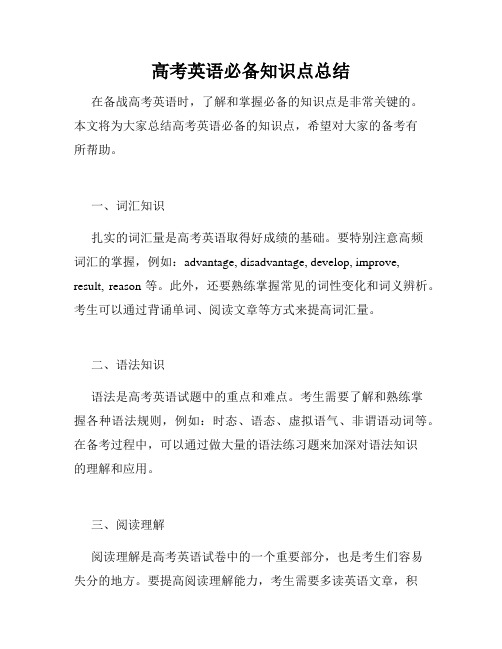
高考英语必备知识点总结在备战高考英语时,了解和掌握必备的知识点是非常关键的。
本文将为大家总结高考英语必备的知识点,希望对大家的备考有所帮助。
一、词汇知识扎实的词汇量是高考英语取得好成绩的基础。
要特别注意高频词汇的掌握,例如:advantage, disadvantage, develop, improve, result, reason等。
此外,还要熟练掌握常见的词性变化和词义辨析。
考生可以通过背诵单词、阅读文章等方式来提高词汇量。
二、语法知识语法是高考英语试题中的重点和难点。
考生需要了解和熟练掌握各种语法规则,例如:时态、语态、虚拟语气、非谓语动词等。
在备考过程中,可以通过做大量的语法练习题来加深对语法知识的理解和应用。
三、阅读理解阅读理解是高考英语试卷中的一个重要部分,也是考生们容易失分的地方。
要提高阅读理解能力,考生需要多读英语文章,积累阅读的经验。
同时,还需要训练自己的阅读速度和理解能力,学会快速获取信息和分析文章的结构和观点。
四、写作技巧写作是高考英语试卷中的一个关键环节,也是考生们表达自己观点的重要方式。
要提高写作技巧,考生需要多写作文,熟悉各类作文的写作结构和表达方式。
同时,还要注意语法和拼写的正确性,以及适当运用一些句式和连接词来增强文章的连贯性。
五、听力技巧听力是高考英语试卷中的一个必考部分,也是提高英语综合能力的关键。
在备考过程中,考生需要多听英语广播、英语电影等,培养对英语听力的习惯。
同时,还要注意训练自己的听力技巧,例如:提前预测、筛选信息和记笔记等。
六、背诵范文背诵范文对于提高英语写作水平和应对作文题的时候非常有帮助。
考生可以背诵一些高分作文,学习其中的优秀词汇、句型和表达方式。
背诵范文可以培养考生的写作思路和表达能力,提高写作的质量和效率。
七、复习方法在备考过程中,考生需要制定合理的复习计划,合理分配各个知识点的复习时间。
同时,要注重练习,做大量的真题和模拟题来提高应试能力。
高中英语知识点总结(高考必考)
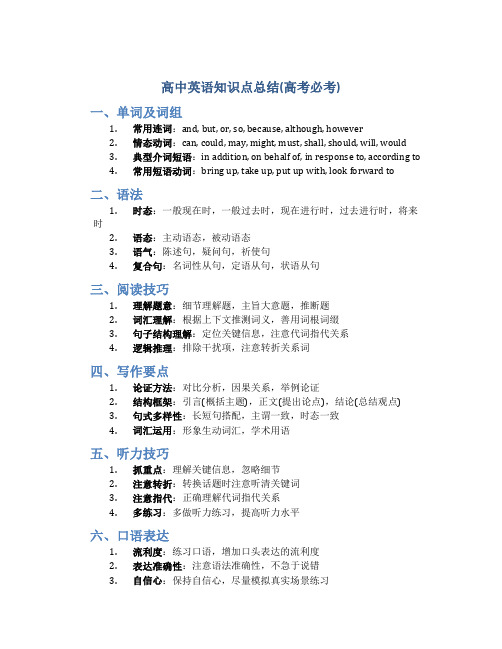
高中英语知识点总结(高考必考)一、单词及词组1.常用连词:and, but, or, so, because, although, however2.情态动词:can, could, may, might, must, shall, should, will, would3.典型介词短语:in addition, on behalf of, in response to, according to4.常用短语动词:bring up, take up, put up with, look forward to二、语法1.时态:一般现在时,一般过去时,现在进行时,过去进行时,将来时2.语态:主动语态,被动语态3.语气:陈述句,疑问句,祈使句4.复合句:名词性从句,定语从句,状语从句三、阅读技巧1.理解题意:细节理解题,主旨大意题,推断题2.词汇理解:根据上下文推测词义,善用词根词缀3.句子结构理解:定位关键信息,注意代词指代关系4.逻辑推理:排除干扰项,注意转折关系词四、写作要点1.论证方法:对比分析,因果关系,举例论证2.结构框架:引言(概括主题),正文(提出论点),结论(总结观点)3.句式多样性:长短句搭配,主谓一致,时态一致4.词汇运用:形象生动词汇,学术用语五、听力技巧1.抓重点:理解关键信息,忽略细节2.注意转折:转换话题时注意听清关键词3.注意指代:正确理解代词指代关系4.多练习:多做听力练习,提高听力水平六、口语表达1.流利度:练习口语,增加口头表达的流利度2.表达准确性:注意语法准确性,不急于说错3.自信心:保持自信心,尽量模拟真实场景练习4.词汇丰富性:扩充词汇量,让表达更加生动有趣以上是关于高中英语知识点总结的内容,希望对您的学习有所帮助。
祝您考试顺利!。
高考必背英语知识点
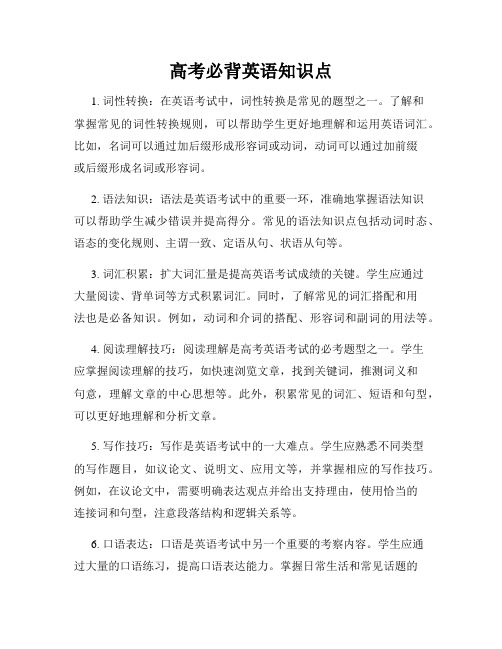
高考必背英语知识点1. 词性转换:在英语考试中,词性转换是常见的题型之一。
了解和掌握常见的词性转换规则,可以帮助学生更好地理解和运用英语词汇。
比如,名词可以通过加后缀形成形容词或动词,动词可以通过加前缀或后缀形成名词或形容词。
2. 语法知识:语法是英语考试中的重要一环,准确地掌握语法知识可以帮助学生减少错误并提高得分。
常见的语法知识点包括动词时态、语态的变化规则、主谓一致、定语从句、状语从句等。
3. 词汇积累:扩大词汇量是提高英语考试成绩的关键。
学生应通过大量阅读、背单词等方式积累词汇。
同时,了解常见的词汇搭配和用法也是必备知识。
例如,动词和介词的搭配、形容词和副词的用法等。
4. 阅读理解技巧:阅读理解是高考英语考试的必考题型之一。
学生应掌握阅读理解的技巧,如快速浏览文章,找到关键词,推测词义和句意,理解文章的中心思想等。
此外,积累常见的词汇、短语和句型,可以更好地理解和分析文章。
5. 写作技巧:写作是英语考试中的一大难点。
学生应熟悉不同类型的写作题目,如议论文、说明文、应用文等,并掌握相应的写作技巧。
例如,在议论文中,需要明确表达观点并给出支持理由,使用恰当的连接词和句型,注意段落结构和逻辑关系等。
6. 口语表达:口语是英语考试中另一个重要的考察内容。
学生应通过大量的口语练习,提高口语表达能力。
掌握日常生活和常见话题的词汇和短语,学会正确地运用问句、陈述句和感叹句等句型,注重语音语调的准确与流利。
7. 听力技巧:听力是高考英语考试中的一项重要考察内容,也是许多学生感到困难的部分。
提高听力技巧需要多听多练。
学生应掌握常见的听力题型,如听力选择题、填空题、完成句子等,并使用一些技巧,如提前预测答案、留意关键词等。
总结起来,高考必背的英语知识点包括词性转换、语法知识、词汇积累、阅读理解技巧、写作技巧、口语表达和听力技巧。
通过充分准备这些知识点,学生可以在考试中取得更好的成绩。
掌握这些基本知识,同时进行针对性的复习和练习,可以提高英语考试的应试能力和综合素养。
202X考生必背高考英语知识点归纳
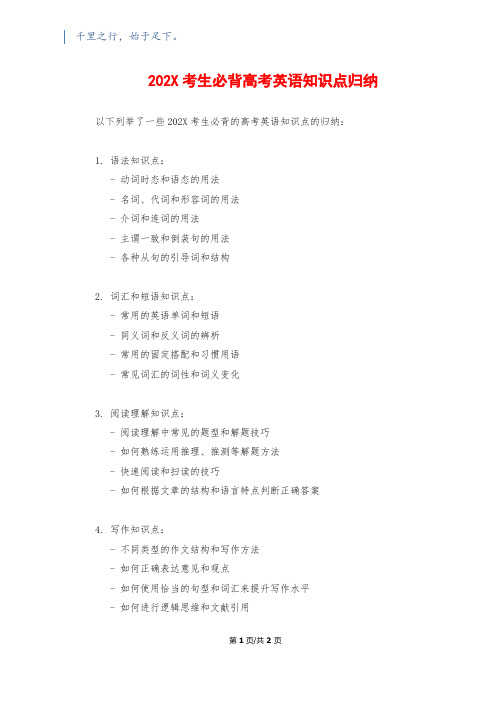
千里之行,始于足下。
202X考生必背高考英语知识点归纳以下列举了一些202X考生必背的高考英语知识点的归纳:
1. 语法知识点:
- 动词时态和语态的用法
- 名词、代词和形容词的用法
- 介词和连词的用法
- 主谓一致和倒装句的用法
- 各种从句的引导词和结构
2. 词汇和短语知识点:
- 常用的英语单词和短语
- 同义词和反义词的辨析
- 常用的固定搭配和习惯用语
- 常见词汇的词性和词义变化
3. 阅读理解知识点:
- 阅读理解中常见的题型和解题技巧
- 如何熟练运用推理、推测等解题方法
- 快速阅读和扫读的技巧
- 如何根据文章的结构和语言特点判断正确答案
4. 写作知识点:
- 不同类型的作文结构和写作方法
- 如何正确表达意见和观点
- 如何使用恰当的句型和词汇来提升写作水平
- 如何进行逻辑思维和文献引用
第1页/共2页
锲而不舍,金石可镂。
5. 听力和口语知识点:
- 听力材料中常见的题型和解题技巧
- 如何提高听力理解和听写的能力
- 口语表达中常用的口语短语和交际用语
- 如何进行语音、语调和语速的调节
这些知识点都是高考英语考试中常见且重要的内容,考生需要通过理解和掌握这些知识点,能够灵活运用到考试中,以确保取得较好的成绩。
同时,还需要通过大量的练习和模拟考试来加强对这些知识点的实际运用能力。
高考英语必背知识点归纳总结
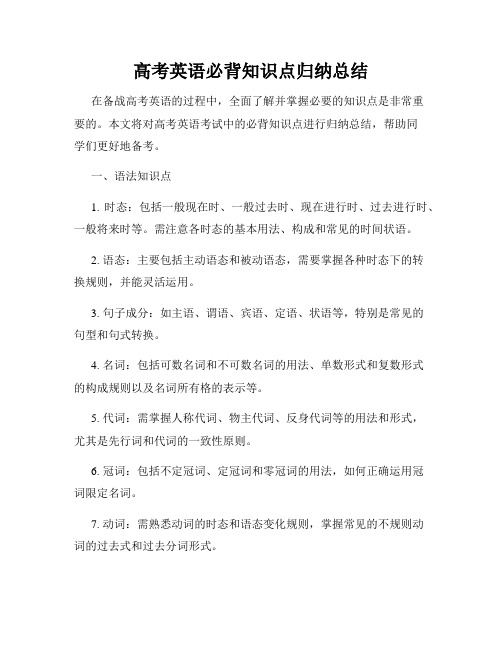
高考英语必背知识点归纳总结在备战高考英语的过程中,全面了解并掌握必要的知识点是非常重要的。
本文将对高考英语考试中的必背知识点进行归纳总结,帮助同学们更好地备考。
一、语法知识点1. 时态:包括一般现在时、一般过去时、现在进行时、过去进行时、一般将来时等。
需注意各时态的基本用法、构成和常见的时间状语。
2. 语态:主要包括主动语态和被动语态,需要掌握各种时态下的转换规则,并能灵活运用。
3. 句子成分:如主语、谓语、宾语、定语、状语等,特别是常见的句型和句式转换。
4. 名词:包括可数名词和不可数名词的用法、单数形式和复数形式的构成规则以及名词所有格的表示等。
5. 代词:需掌握人称代词、物主代词、反身代词等的用法和形式,尤其是先行词和代词的一致性原则。
6. 冠词:包括不定冠词、定冠词和零冠词的用法,如何正确运用冠词限定名词。
7. 动词:需熟悉动词的时态和语态变化规则,掌握常见的不规则动词的过去式和过去分词形式。
8. 形容词和副词:需掌握形容词和副词的基本用法和比较级、最高级的构成方式,以及常见的用法搭配。
9. 连词:包括并列连词、从属连词和状语从句引导词等的用法和常见的连接词组。
10.介词:需了解介词的基本用法和常见搭配,以及一些固定的介词短语的用法。
二、词汇和短语1. 同义词和反义词:需熟悉一些常见的同义词和反义词,并能够正确运用。
2. 词根词缀:了解一些常见的词根和词缀,能够根据上下文推断词义,并能够积极扩充词汇量。
3. 习惯用语和固定搭配:熟悉一些常见的习惯用语和固定搭配,能够正确运用。
4. 高频考点:复习并掌握常见的高频考点词汇和常用短语,如表示数量、时间、原因和结果等。
三、阅读技巧1. 快速阅读:培养快速浏览全文,掌握主题思想和段落大意的能力。
2. 词汇猜测:通过上下文提供的线索和词根词缀猜测生词的词义。
3. 理解推断:根据文章中的信息和逻辑推理,进行推断和判断。
4. 精读技巧:学会细致阅读,抓住重点和关键词,理解文章的细节信息和作者的观点。
- 1、下载文档前请自行甄别文档内容的完整性,平台不提供额外的编辑、内容补充、找答案等附加服务。
- 2、"仅部分预览"的文档,不可在线预览部分如存在完整性等问题,可反馈申请退款(可完整预览的文档不适用该条件!)。
- 3、如文档侵犯您的权益,请联系客服反馈,我们会尽快为您处理(人工客服工作时间:9:00-18:30)。
高考英语必背知识点总结归纳【篇一】高考英语必背知识点总结归纳被动语态概述被动语态的概念:它是动词的一种形式,表示主语与谓语之间的执行或被执行关系。
主动语态表示主语是谓语动作的执行者,例如:They saw the little boy crying by the river.被动语态表示主语是谓语动作的承受者,例如:The little boy was seen crying by the river.被动语态的构成被动语态的形式是由“助动词be+动词的过去分词”构成。
助动词be随着主语的人称、数、时态等的不同而变化。
几种常见时态的被动语态形式如下:1.一般现在时am/is/are+过去分词例如:Rice is planted in the south of China.2.一般过去时was/were+过去分词例如:These trees were planted the year before last.3.一般将来时will/shall+be+过去分词例如:A sports meeting will be held next week in our school.4.现在进行时am/is/are+being+过去分词例如:Your radio is being repaired now.5.过去进行时was/were+being+过去分词When he got there,the problem was being discussed.6.现在完成时have/has+been+过去分词His work has been finished.Has his work been finished? Yes,it has./No,it hasn’t.7.过去完成时had+been+过去分词注意:1.除了be之外的其它系动词如get,stay等也可以和过去分词构成被动语态。
例如:Their questions haven’t got answered.2.含有情态动词的谓语变成被动语态使用“情态动词+be+过去分词”结构。
例如:More attention should be paid to the old in this country.This work can’t be done until Mr.Black es.3.含有“be going to”,“be to”等结构的谓语,其被动语态分别用“be going to+be+过去分词”和“be to+be+过去分词”。
例如:The problem is going to be discussed at the next meeting.All these books are to be taken to the library.4.被动语态与系表结构的区别:“连系动词+用作表语的过去分词”构成的系表结构,与被动语态的形式完全一样,所以应注意它们的区别。
被动语态中的过去分词是动词,多强调动作;系表结构中的过去分词相当于形容词,多强调状态。
前者通常可用by 引出动作的执行者,而后者则不可以。
例如:The map was changed by someone.(被动结构)That custom remained unchanged for many centuries.(系表结构)系表结构中的过去分词通常可被very修饰,被动语态中的过去分词往往要用much修饰。
例如:He was very excited.(系表结构)He was much excited by her words.(被动结构)5.主动形式表被动意义。
有些动词的主动形式有被动意味,如open,read,sell,shut,wash,wear,write等。
此时句子的主语一般是物。
例如:These books sell well.这些书很畅销。
The door won’t shut.这门关不上。
The clothes wash well.这些衣服很好洗。
【篇二】高考英语必背知识点总结归纳1情态动词与助动词1、can能,可以,表说话人同意,许可还可表客观条件许可,如:You can go now.提建议或请求时可用can I, can you表客气,如Can I buy you a drink?can和be able to表能力时的区别。
can表一般具有的能力,be able to表在特定条件下的能力,如:Although the driver was badly hurt,he wasable to explain what had happened.2、may(1)可以,表说话人同意,许可或请求对方许可。
You may go.(2)(现在和将来)可能,也许,只用于肯定句和否定句中,如He may not be right.3、must,have tomust表主观上的必须,have to表客观上的必须,如:It"s getting late. I have to go. -Must I go now.-Yes,you must.(No, you needn"t./ No, you don"t have to.)4、need,dare这二词有实意动词和情态动词两种词性,如用作实意动词后接动词不定式to do,如用作情态动词后接动词原形。
Need I go now? --Yes, you must./No, you needn"t.)5、shall用于第一人称疑问句中表说话人征求对方的意见或向对方请求,如,Shall we begin our lesson?用于二、三人称陈述句,表说话人命令、警告、允诺、威胁等口吻,如: You shall fail if you don"t workharder.6、should表应该,意为有责任,有义务。
如:We should try our best to make our country more beautiful.7、will表有做某事的意志、意愿、安心、打算,如"Will you lend me your book?" "Yes, I will."8、should have done表应该做而未做must have done表对过去事实的肯定推测could have done表本可以做某事9、判断句:肯定句用must, 否定句用can"t,不太肯定用may,mightHe must be in the office now.He must have gone to bed, for the light is out.He can"t be in the office. He is at home.He couldn"t have cleaned the classroom, because he didn"t e here today.He might be in the office, I am not sure.He might have cleaned the room, I suppose.2让步状语从句1、though,although,as的区别A、Though,although的主句中可以用yet, still, nevertheless,但不可使用but。
B、though引导的从句可以倒装,也可以不倒装;as引导的从句必须倒装;although引导的从句不能倒装。
其结构为:形容词/分词/副词/动词原形/名词(无冠词)+as/though+主语+谓语……2、though可用作副词,放在句末,意为“不过,但是”。
Although无此用法。
3、某些短语也引导让步的从句或短语,意为“尽管”,如:in spite of the fact that, despite the factthat,regardless of(the fact that)句子种类1、陈述句的否定(1)在含有宾语从句的主从复合句中,当主句的谓语动词是think, expect, believe, suppose, guess, fancy,imagine 等,且主句主语是第一人称时,宾语从句谓语的否定习惯上要移到主句谓语上,如: I don"t think he is right.(2)含有否定意义的副词never, seldom, hardly, scarcely, rarely, barely的句子应视为否定句,如: I have never been there before.2、反意疑问句(1)need和dare 既可作情态动词,又可作实意动词,在反问部分须加以区别,如We needn"t leave, need we? We don"t need to leave, do we?(2)陈述部分出现否定意义的副词或代词如never, seldom, few, hardly, little等时,反问部分须用肯定形式,如:He seldom es, does he?(3)陈述部分用不定代词作主语时,反问部分的主语用it ,如:Nothing can stop me, can it?陈述部分用everybody, everyone, somebody, someone,等作主语时,反问部分常用it,有时也用they,如:Everybody knows that, don"t they?(4)陈述部分包括used to 时,反问部分可有两种形式,如: You used to get up early, usedn"t (didn"t) you?(5)陈述部分是"there + be"结构时,反问部分用there,如:There"s something wrong with you, isn"t there?(6)陈述部分是含有宾语从句的主从复合句时,反问部分的主语和谓语应和主句保持一致,如: He never told others what he thought, did he?但,如果是I think , I believe等+宾语从句时,反问部分须和从句的动词保持一致,如,I don"t think he is right, is he? I don"t believe he does that, does he?3、感叹句用what或how,What a beautiful park it is.How beautiful a park it is.How beautiful the park is.How we worked!4、祈使句Take care!Don"t stand there.Please open the door for the old lady.3不定式的构成1、不定式的一般式:不定式的一般式所表示的动作通常与主要谓语的动作同时或几乎同时发生,或是在它之后发生。
